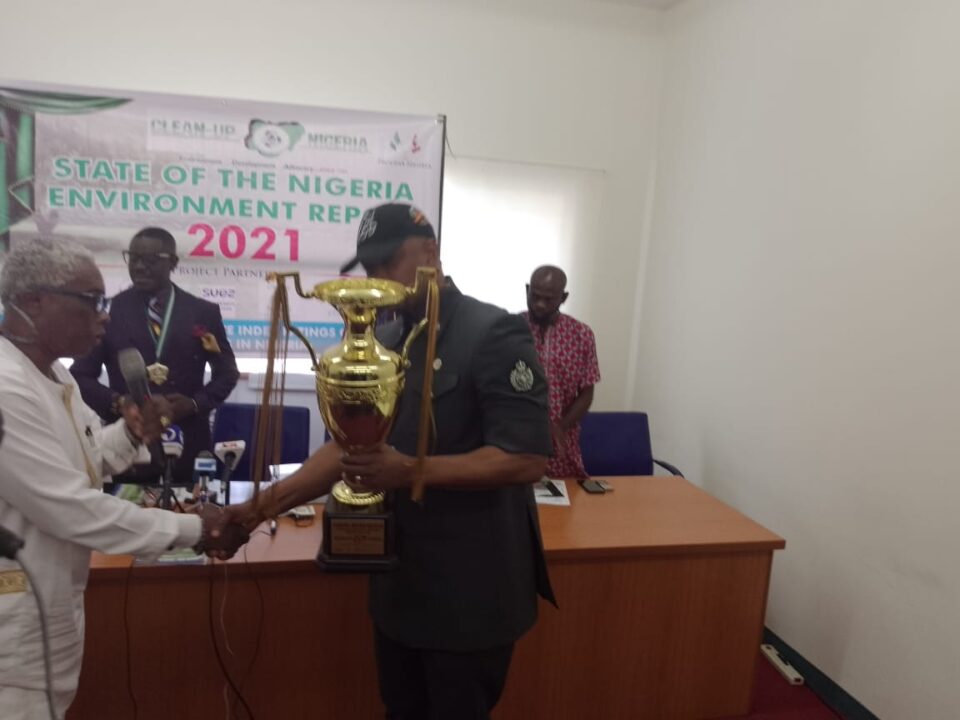By Oyema-Aziken
A report by Clean Up Nigeria National Technical Study Group has rated 32 states in the country as unclean.
The Group stated this in the Clean Up Nigeria “State of the Nigeria Environment Report:2021 Cleanliness performance index ratings of all States /towns in Nigeria” report released in Abuja on Thursday.
The report ranked Borno State and Lokoja city dirtiest State and cities respectively.
Presenting the report, The National Coordinator/Secretary, Clean Up Nigeria National Technical Study Group, Prince Ene Baba Owoh (jr) said Akwa Ibom State ranked as the cleanest State for the year 2021 with 64 percent while Abuja emerged the cleanest city with 79 percent.
He said the project deployed full application of world’s highest satellite imagery system (GEO-EYE-1)
He explained that the GEO-EYE-1 collects spectral images at 0.14 meters or 16 inches from orbit quarterly year round as monitored from Canada to give accurate and reliable data base.
Owoh said the cleanliness performance index ratings study was carried out for a full calendar year December 2020-November 2021.
“Painfully, 32 out of 36 States including the rest of FCT outside Abuja city by our statistical study are rated as unclean States.
“As observed from our satellite imagery 95 percent of the State/Towns in the country recorded poor performance under five variables of ,in our performance indicators (street/road cleanliness, vegetation control/distilling, waste management, services, public opinion pool and knowledge and attitude and practice of hygiene and sanitation).
“Except States like Akwa Ibom,Ebonyi and Kaduna including Abuja metropolis however, stepped up their environmental activities during the period under review (2021), ” he said
“We congratulate the Akwa Ibom people and Government for emerging the Cleanest State for the year 2021 in Nigeria, with a cumulative score of 64% and the 2nd and 3rd States (Ebonyi 55% and Bauchi 44%) and also Abuja for emerging the cleanest city in Nigeria for year 2021 with 79% closely followed by Uyo with 63%.”
The report called on all stakeholders to engage in peer review mechanism by making out time to visit both the winning States/Cities and the backward States/Cities to benefit and gain more insights to what the top States are doing in order to improve their performance ratings.
The report also called on Nigerians to embrace strong personal hygiene and good sanitation habits and to dispose of their waste at the right places.
“We are encouraged by government at all levels and the populace in the sense that after the initial three cleanliness index ratings studies we carried out in 2018, 2019 and 2020 there has been encouraging improvement in hygiene/sanitation practice across the states by 3% in year 2021.
“This is in line with the project’s goal which is founded on bringing sanitation and waste management to the front burner of both government, the populace and in the process increase awareness and encourage alternative actions on personal hygiene/sanitation in order to ensure a cleaner, healthier and safer Nigeria.” he said
The report recommended among other things that “Government at all levels and communities including individuals should, as a matter of urgency, take seriously the aspect of knowledge, attitude and practice (KAP) of hygiene and sanitation to improve their living conditions in order to increase the average life expectancy in Nigeria from 45 years to 55 years
“Funding allocated for sanitation and waste management should be stepped up by at least 100% by States/Local Government Councils while corporate organizations should support/ donate sanitation and waste management facilities to States/Local Councils. At this point, we duty bound to commend the donation of waste management facilities by the present administration of NDDC to some Niger Delta States in 2021.
“Employers of labour should improve the living condition and wages of sanitation workers; in view of the unsanitary conditions that they are exposed to, this they begin by first providing them with (PPE) personal protection equipment and Medicare.
“The informal sector engaged in waste recycling and reuse industry should be encouraged by Corporate Organizations and government at all levels as a means of creating employment, through waste to wealth initiatives. We commend States like Akwa Ibom, Lagos, Oyo and Rivers, Kaduna and Bauchi for their efforts in this direction.
“The dangers of open defecation need to be tackled head-on and this can be achieved through partnership consideration with the private sector nationwide. This will help reduce the incidence and prevalence of diseases associated with it and increase healthier living for all. If we must end open defecation in the country let us start with the provision of public toilets in order to meet the 2025 target of ending open defecation and making it a reality in Nigeria.
“Nigeria continues to be rated as the country with the highest rate of open defection in the world by (WHO) Word Health Organization and we reaffirm it from our studies. It therefore becomes imperative that all hands must be on deck to reverse this ugly trend if we must meet 2025 target to end open or reduce it drastically.
“We encourage Government at all levels to partner the private sector to help address this embarrassing situation by providing public toilets/baths in public places through BOT (Build, Operate and Transfer) so the people can have access to toilets.
“We encourage Government at all levels to re-introduce the monthly sanitation exercise and enforce the regular clean-up of drains with renewed energy as 80% of the States have seriously neglected the cleaning of gutter/drains and vegetation control.
“There is the need to set-up and strengthen more health and environment clubs across schools nationwide to improve and sustain the practice of hygiene and sanitation among our children.”



